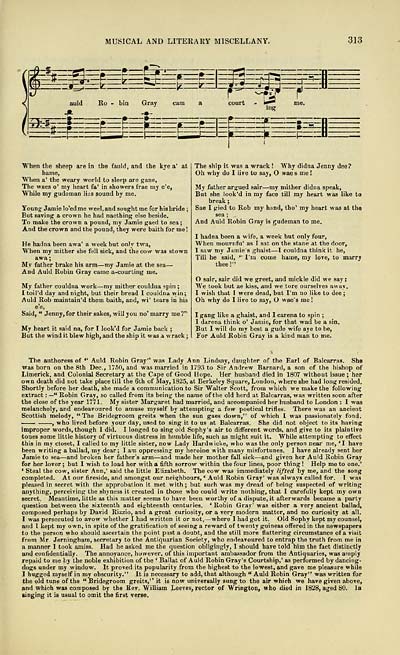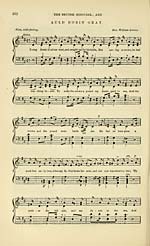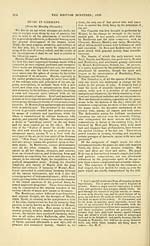Glen Collection of printed music > Printed music > British minstrel, and musical and literary miscellany
(651) Page 313
Download files
Complete book:
Individual page:
Thumbnail gallery: Grid view | List view

MUSICAL AND LITERARY MISCELLANY.
313
When the sheep are in the fauld, and the kye a' at
hame,
AVhen a' the weary world to sleep are gane,
The waes o' my heart fa' in showers frae my e'e.
While my gudoman liss sound by me,
Youno^ Jamie lo'ed me weel.and sought me for hisbrtde ;
But saving a crown he had naething else beside.
To make the crown a pound, my Jamie gaed to sea ;
And the crown and the pound, they were baith for mel
He hadna been awa' a week but only twa,
When my mither she fell sick, and the cow was stown
awa;
My father brake his arm — my Jamie at the sea —
And Auld Robin Gray came a-courting me.
My father couldna work — my mither couldna spin ;
I toil'd day and night, but their bread I couldna win;
Auld Rob maintain'd them baith, and, wi' tears in his
e'e,
Said, " Jenny, for their sakes, will you no' marry me ?*'
My heart it said na, for I look'd for Jamie back ;
But the wind it blew highland the ship it was a wrack;
The ship it was a wrack ! Why didna Jenny dee?
Oh why do I live to say, O wae s me I
My father argued sair — my mither didna speak,
But she look'd in my face till my heart was like to
break ;
Sae I gied to Rob my hiind, tho' my heart was at the
sea ;
And Auld Robin Gray is gudeman to me.
I hadna been a wife, a week but only four,
When mournfu' as I sat on the stane at the door,
I saw my Jamie's ghaist — 1 couldna think it he,
Till he said, *' I'm come hame, my love, to marry
thee!"
sair, sair did we greet, and mickle did we say ;
AVe took but ae kiss, and we tore ourselves away.
1 wish that I were dead, but I'm no like to dee ;
Oh why do I live to say, O wae's me I
I gang like a ghaist, and I carena to spin ;
I darena think o* Jamie, for that wad be a sin.
But I will do my best a gude wife aye to be,
For Auld Robin Grav is a kind man to me.
The authoress of " Auld Robin Gray'* was Lady Ann Lindsay, daughter of the Earl of Balcarras. She
■was born on the 8th Dec, 1750, and was married in 1793 to Sir Andrew Barnard, a son of the bishop of
Limerick, and Colonial Secretary at the Cape of Good Hope. Her husband died in 1807 without issue ; her
own death did not take place till the 6th of May, 1825, at Berkeley Square, London, where she had long resided.
Shortly before her death, she made a communication to Sir Walter Scott, from which we make the following
extract : — " Robin Gray, so called from its being' the name of the old herd at Balcarras^ was written soon after
the close of the year 1771. My sister Margaret had married, and accompanied her husband to London : I was
melancholy, and endeavoured to amuse myself by attempting a few poetical trifles. There was an ancient
Scottish melody, "The Bridegroom greits when the sun gaes down," of which I was passionately fond.
, who lived before your day, used to sing it to us at Balcarras. She did not object to its having
improper words, though 1 did. I longed to sing old Sophy's air to different words, and give to its plaintive
tones some little history of virtuous distress in humble life, such as might suit it. While attempting to effect
this in my closet, I called to my little sister, now Lady Hardwicke, who was the only person near me, ' I have
been writing a ballad, my dear; I am oppressing my heroine with many misfortunes. I have already sent her
Jamie to sea — and broken her father's arm — and made her mother fall sick — and given her Auld Robin Gray
for her lover ; but I wish to load her with a fifth sorrow within the four lines, poor thing ! Help me to one.'
* Steal the cow, sister Ann,' said the little Elizabeth. The cow was immediately lifted by me, and the song
completed. At our fireside, and amongst our neighbours, * Auld Robin Gray* was always called for. I was
pleased in secret with the approbation it met with ; but such was my dread of being suspected of writing
anything, perceiving the shyness it created in those who could write nothing, that I carefully kept my own
secret. Meantime, little as this matter seems to have been worthy of a dispute, it afterwards became a party
question between the sixteenth and eighteenth centuries, * Robin Gray' was either a very ancient ballad,
composed perhaps by David Rizzio, and a great curiosity, or a very modern matter, and no curiosity at all.
I was persecuted to avow whether I had written it or not, — where I had got it. Old Sophy kept my counsel,
and I kept my own, in spite of the gratification of seeing a reward of twenty guineas offered in the newspapers
to tbe person who should ascertain the point past a doubt, and the still more flattering circumstance of a visit
from Mr Jerningham, secretary to the Antiquarian Society, who endeavoured to entrap the truth from me in
a manner I took amiss. Had he asked me the question obligingly, I should have told him the fact distinctly
and confidentially. The annoyance, however, of this important ambassador from the Antiquaries, was amply
repaid to me by the noble exhibition of the * Ballat of Auld Robin Gray's Courtship,* as performed by dancing-
dogs under my window. It proved its popularity from the highest to the lowest, and gave me pleasure while
I hugged myself in my obscurity," It is necessary to add, that although " Auld Robin Gray" was written for
tbe old tune of the " Bridegroom greits,'' it is now universally sung to the air which we have given above,
and which was composed by the Rev. William Leeves, rector of Wrington, who died in 1828, aged 80. In
Kinging it is usual to omit the first verse.
313
When the sheep are in the fauld, and the kye a' at
hame,
AVhen a' the weary world to sleep are gane,
The waes o' my heart fa' in showers frae my e'e.
While my gudoman liss sound by me,
Youno^ Jamie lo'ed me weel.and sought me for hisbrtde ;
But saving a crown he had naething else beside.
To make the crown a pound, my Jamie gaed to sea ;
And the crown and the pound, they were baith for mel
He hadna been awa' a week but only twa,
When my mither she fell sick, and the cow was stown
awa;
My father brake his arm — my Jamie at the sea —
And Auld Robin Gray came a-courting me.
My father couldna work — my mither couldna spin ;
I toil'd day and night, but their bread I couldna win;
Auld Rob maintain'd them baith, and, wi' tears in his
e'e,
Said, " Jenny, for their sakes, will you no' marry me ?*'
My heart it said na, for I look'd for Jamie back ;
But the wind it blew highland the ship it was a wrack;
The ship it was a wrack ! Why didna Jenny dee?
Oh why do I live to say, O wae s me I
My father argued sair — my mither didna speak,
But she look'd in my face till my heart was like to
break ;
Sae I gied to Rob my hiind, tho' my heart was at the
sea ;
And Auld Robin Gray is gudeman to me.
I hadna been a wife, a week but only four,
When mournfu' as I sat on the stane at the door,
I saw my Jamie's ghaist — 1 couldna think it he,
Till he said, *' I'm come hame, my love, to marry
thee!"
sair, sair did we greet, and mickle did we say ;
AVe took but ae kiss, and we tore ourselves away.
1 wish that I were dead, but I'm no like to dee ;
Oh why do I live to say, O wae's me I
I gang like a ghaist, and I carena to spin ;
I darena think o* Jamie, for that wad be a sin.
But I will do my best a gude wife aye to be,
For Auld Robin Grav is a kind man to me.
The authoress of " Auld Robin Gray'* was Lady Ann Lindsay, daughter of the Earl of Balcarras. She
■was born on the 8th Dec, 1750, and was married in 1793 to Sir Andrew Barnard, a son of the bishop of
Limerick, and Colonial Secretary at the Cape of Good Hope. Her husband died in 1807 without issue ; her
own death did not take place till the 6th of May, 1825, at Berkeley Square, London, where she had long resided.
Shortly before her death, she made a communication to Sir Walter Scott, from which we make the following
extract : — " Robin Gray, so called from its being' the name of the old herd at Balcarras^ was written soon after
the close of the year 1771. My sister Margaret had married, and accompanied her husband to London : I was
melancholy, and endeavoured to amuse myself by attempting a few poetical trifles. There was an ancient
Scottish melody, "The Bridegroom greits when the sun gaes down," of which I was passionately fond.
, who lived before your day, used to sing it to us at Balcarras. She did not object to its having
improper words, though 1 did. I longed to sing old Sophy's air to different words, and give to its plaintive
tones some little history of virtuous distress in humble life, such as might suit it. While attempting to effect
this in my closet, I called to my little sister, now Lady Hardwicke, who was the only person near me, ' I have
been writing a ballad, my dear; I am oppressing my heroine with many misfortunes. I have already sent her
Jamie to sea — and broken her father's arm — and made her mother fall sick — and given her Auld Robin Gray
for her lover ; but I wish to load her with a fifth sorrow within the four lines, poor thing ! Help me to one.'
* Steal the cow, sister Ann,' said the little Elizabeth. The cow was immediately lifted by me, and the song
completed. At our fireside, and amongst our neighbours, * Auld Robin Gray* was always called for. I was
pleased in secret with the approbation it met with ; but such was my dread of being suspected of writing
anything, perceiving the shyness it created in those who could write nothing, that I carefully kept my own
secret. Meantime, little as this matter seems to have been worthy of a dispute, it afterwards became a party
question between the sixteenth and eighteenth centuries, * Robin Gray' was either a very ancient ballad,
composed perhaps by David Rizzio, and a great curiosity, or a very modern matter, and no curiosity at all.
I was persecuted to avow whether I had written it or not, — where I had got it. Old Sophy kept my counsel,
and I kept my own, in spite of the gratification of seeing a reward of twenty guineas offered in the newspapers
to tbe person who should ascertain the point past a doubt, and the still more flattering circumstance of a visit
from Mr Jerningham, secretary to the Antiquarian Society, who endeavoured to entrap the truth from me in
a manner I took amiss. Had he asked me the question obligingly, I should have told him the fact distinctly
and confidentially. The annoyance, however, of this important ambassador from the Antiquaries, was amply
repaid to me by the noble exhibition of the * Ballat of Auld Robin Gray's Courtship,* as performed by dancing-
dogs under my window. It proved its popularity from the highest to the lowest, and gave me pleasure while
I hugged myself in my obscurity," It is necessary to add, that although " Auld Robin Gray" was written for
tbe old tune of the " Bridegroom greits,'' it is now universally sung to the air which we have given above,
and which was composed by the Rev. William Leeves, rector of Wrington, who died in 1828, aged 80. In
Kinging it is usual to omit the first verse.
Set display mode to: Large image | Transcription
Images and transcriptions on this page, including medium image downloads, may be used under the Creative Commons Attribution 4.0 International Licence unless otherwise stated. ![]()
| Special collections of printed music > Glen Collection of printed music > Printed music > British minstrel, and musical and literary miscellany > (651) Page 313 |
|---|
| Permanent URL | https://digital.nls.uk/91442757 |
|---|
| Description | Scottish songs and music of the 18th and early 19th centuries, including music for the Highland bagpipe. These are selected items from the collection of John Glen (1833 to 1904). Also includes a few manuscripts, some treatises, and other books on the subject. |
|---|
| Description | The Glen Collection and the Inglis Collection represent mainly 18th and 19th century Scottish music, including Scottish songs. The collections of Berlioz and Verdi collected by bibliographer Cecil Hopkinson contain contemporary and later editions of the works of the two composers Berlioz and Verdi. |
|---|

